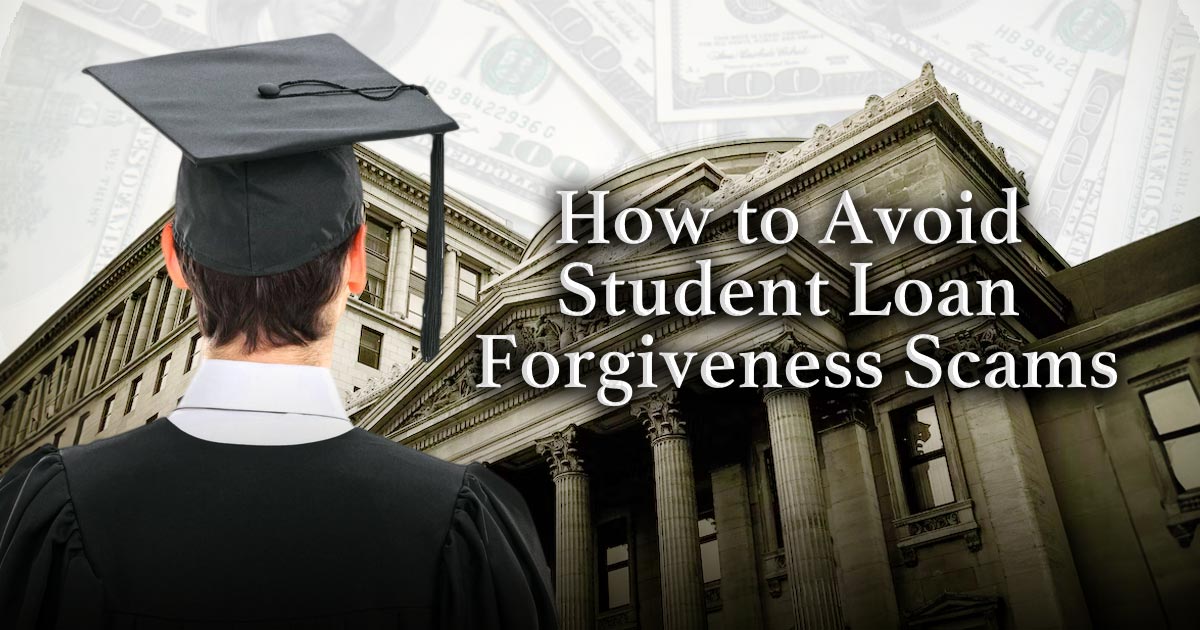How to Avoid Student Loan Forgiveness Scams

Scams targeting people with student loan debt have increased in response to President Biden’s recent announcement regarding student loan relief, which allows qualifying borrowers to have up to $20,000 in federal student loan debt cancelled. The purpose of these con games is to defraud individuals before the real programme launches.
Being on the lookout for prospective scammers is crucial for protecting oneself. Here are some warning indicators to be aware of in order to avoid becoming a victim of schemes involving the forgiveness of student loans.
Unsolicited Contacts
The Department of Education will not randomly contact you to request your password, FSA ID, social security number, or any other personal information. Therefore, it’s imperative to avoid giving out such information over the phone or by email, particularly if someone is posing as a government representative.
Cunning con artists frequently imitate official seals or use fictitious official email addresses. Do not answer questions, click links, or download anything if you receive unsolicited calls or emails requesting personal information. Visit secure government websites directly instead.
Upfront Charges
Recognise that enrollment will not require payment upon the program’s formal launch. Anyone stating they can ensure eligibility, skip the queue, or expedite your application is probably running a scam, according to the FTC, in addition to lying.
In addition to frauds involving the upcoming assistance programme, be cautious of schemes that require advance fees for debt relief services. Federal Student Aid states that it is against the law for a corporation to charge you up advance for debt consolidation services.
Request for Your FSA ID
One important component that functions as a legally recognised signature in online systems used by the US Department of Education is your FSA ID. According to AARP, protecting this ID is essential because fraudsters could use it to access your student assistance account, change information, or reroute your payments.
Refrain from disclosing your FSA ID to anybody, and take it seriously if someone asks for it.
Pressure Tactics
You may be dealing with a fraudster if you feel under pressure to take immediate action. If they say that if you wait, you might lose out on loan forgiveness, but resist the impulse to hurry.
Take your time to independently confirm the program’s details. Make careful to visit secure.gov websites when visiting official government websites directly. As scammers are capable of creating phoney websites, be sure you’re connecting to reliable platforms.
Steps to Take if Scammed
If you think you may have been duped, respond quickly to avoid worsening the situation. If you gave criminals your credit card number or bank account details, get in touch with your credit card issuer and bank to close any open accounts.
Additionally, contact your student loan servicer if you disclosed any information about your student loans, such as your FSA ID and password. CNBC advises you to take an extra precaution by reviewing your credit report.
Handling Scam Attempts
You should end a questionable call right away, and you should not answer any emails or letters that you receive. According to CNBC, you may not need to take quick action if you don’t interact or offer any information.
Still, it’s important to alert the authorities about possible con artists. You can provide the specifics of the case in a complaint that you submit to the state attorney general or the Federal Trade Commission.
Understanding the Debt Forgiveness Program
Under President Biden’s newly announced debt relief programme, if an individual makes less than $125,000 or a couple makes less than $250,000, they can have up to $20,000 in debt erased. According to the White House, beneficiaries of Pell Grants may be eligible for the entire $20,000, while recipients of non-Pell Grants may be eligible for debt cancellation of up to $10,000.
If, following the forgiveness, you are still in debt from federal student loans, note December 31, 2022, on your calendar. It is anticipated that at this point, the federal student loan repayment moratorium would end and payments will resume in January 2023.
Preparation for Application
Borrowers can start preparing even though the Biden administration’s student loan forgiveness programme application won’t be available until October. Bloomberg recommends:
- Signing up for email updates from the Department of Education to receive notifications when the application goes live.
- Checking if the company servicing your student loans has your most recent contact information.
- Compiling your tax returns for 2020 and 2021 to see if you satisfy the requirements for income eligibility.
- Looking into reimbursements for any money paid towards federal student loans during the suspension.
To guarantee relief before the payment pause expires, Education Secretary Miguel Cardona advises filing applications four to six weeks prior to November 15.
Exploring Other Forgiveness Programs
There are other respectable debt reduction initiatives outside the recently announced assistance programme. According to Investopedia, there are more programmes including Perkins Loan Cancellation, Teacher Loan Forgiveness, and Public Service Loan Forgiveness.
These programmes serve educators, public servants, and employees of nonprofit organisations, and they may provide more forgiveness. To fully comprehend the application procedures for each programme, it is imperative that you collect information about them from safe government websites.
In Conclusion
There is a chance for fraud even though the upcoming debt relief programme will provide many Americans who are struggling with student loans with a great deal of comfort. Remain wary and refrain from answering unwanted emails that ask for personal information.
To protect yourself from con artists trying to take advantage of people navigating the program’s rollout, confirm information through official government channels and report any suspect activity.

Editor-in-Chief • Industry Trends Writer
Ethan analyzes market shifts and predicts future developments in different industries to keep his audience well informed and ready.

